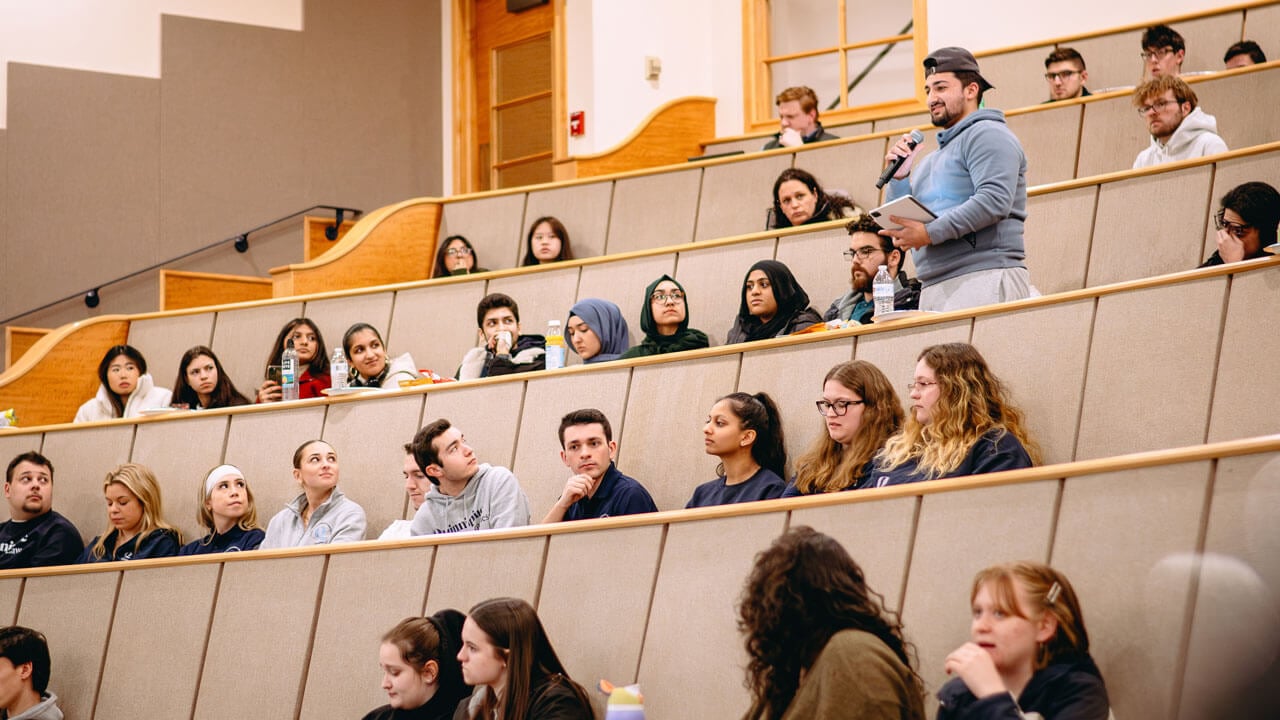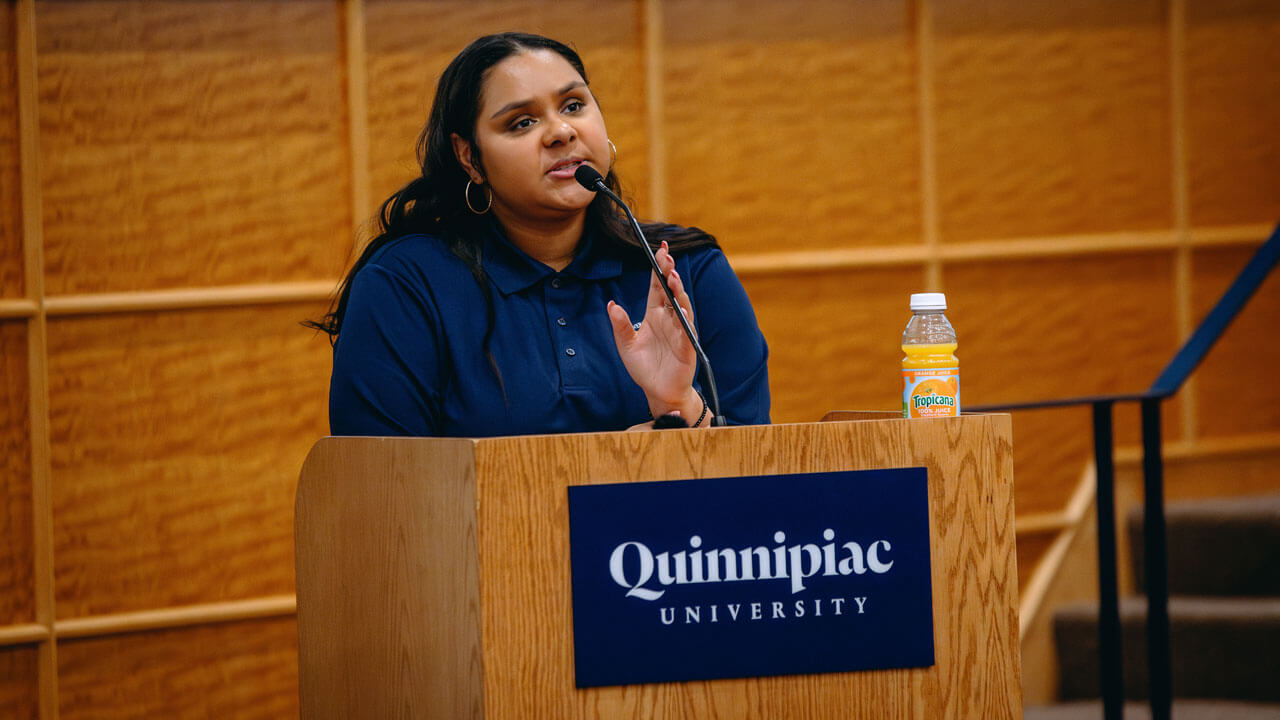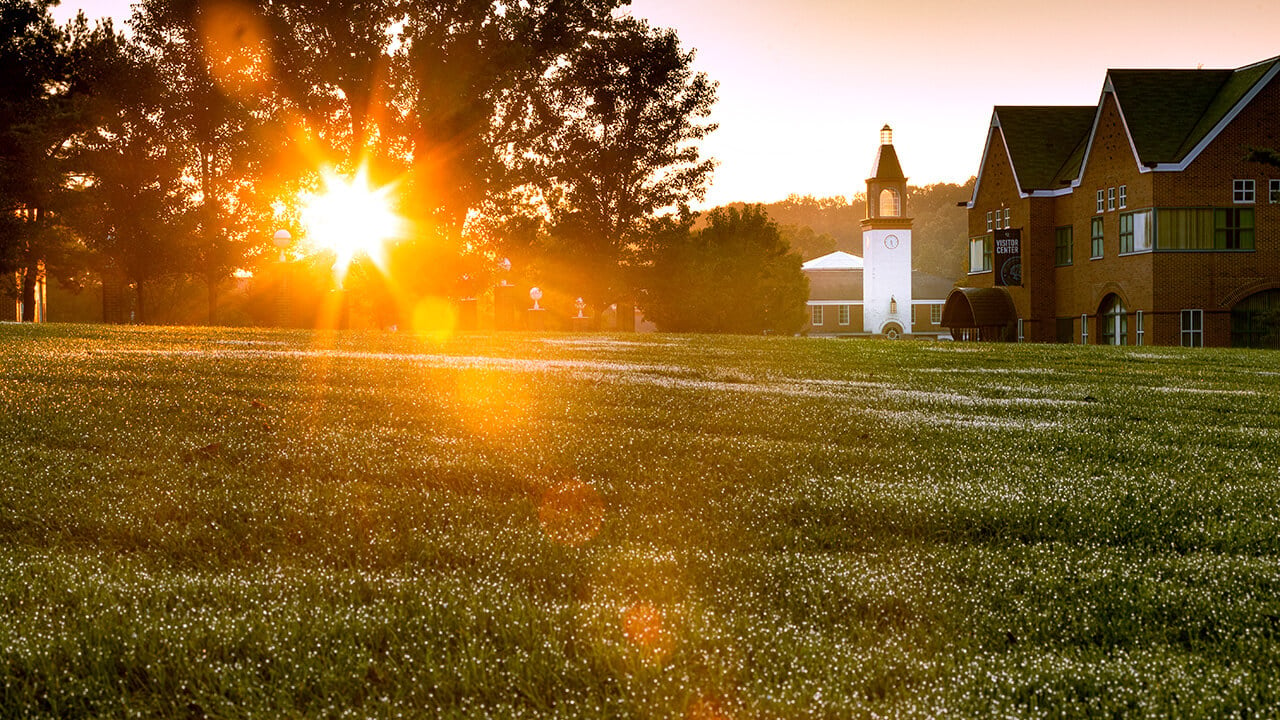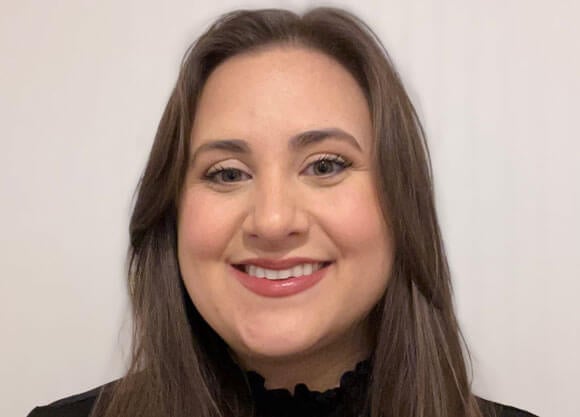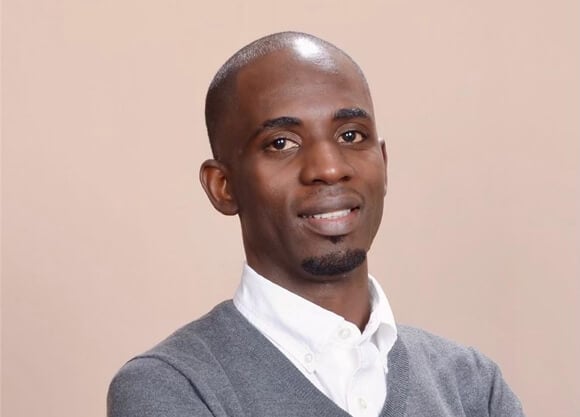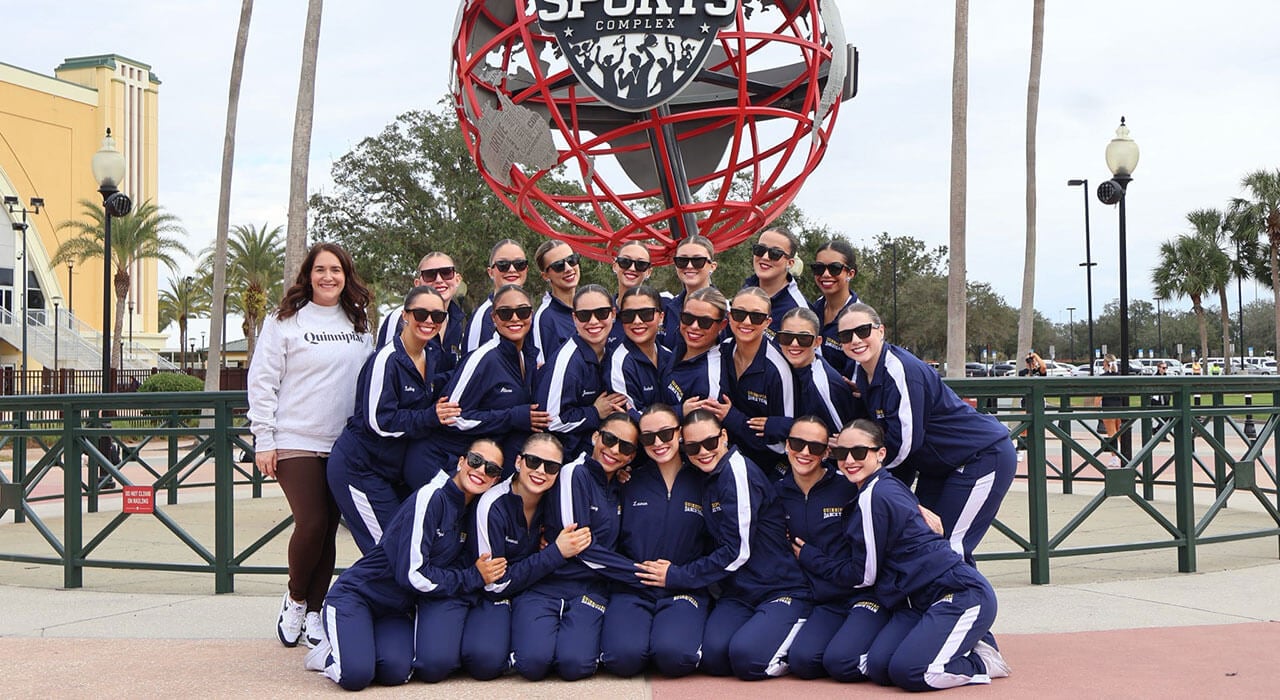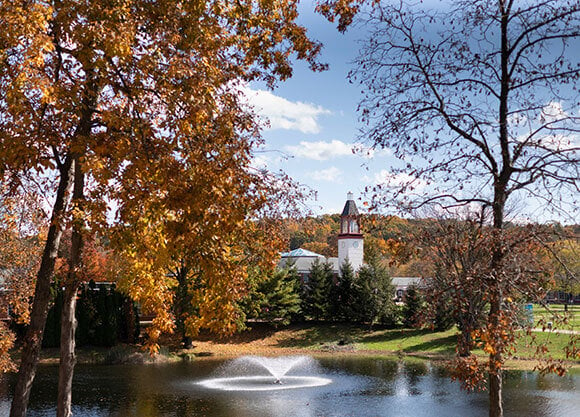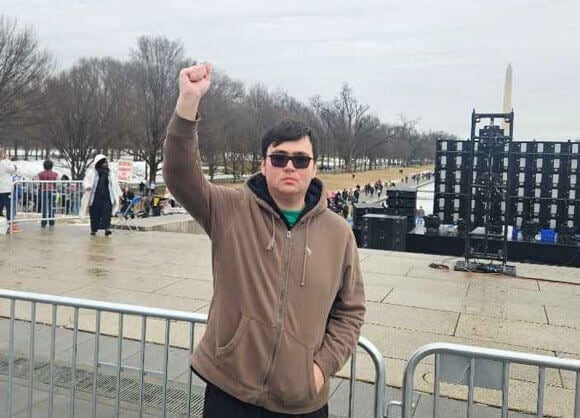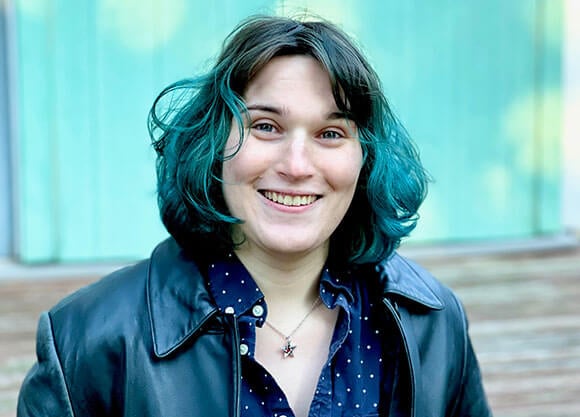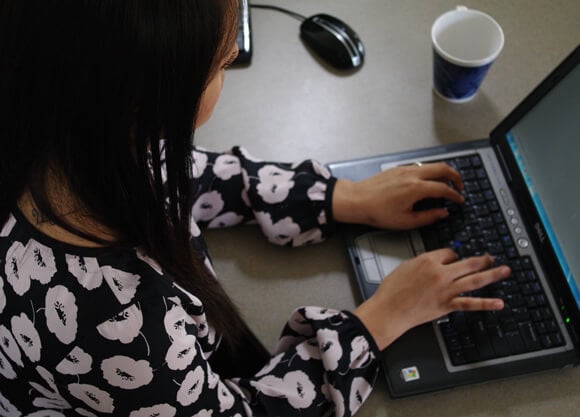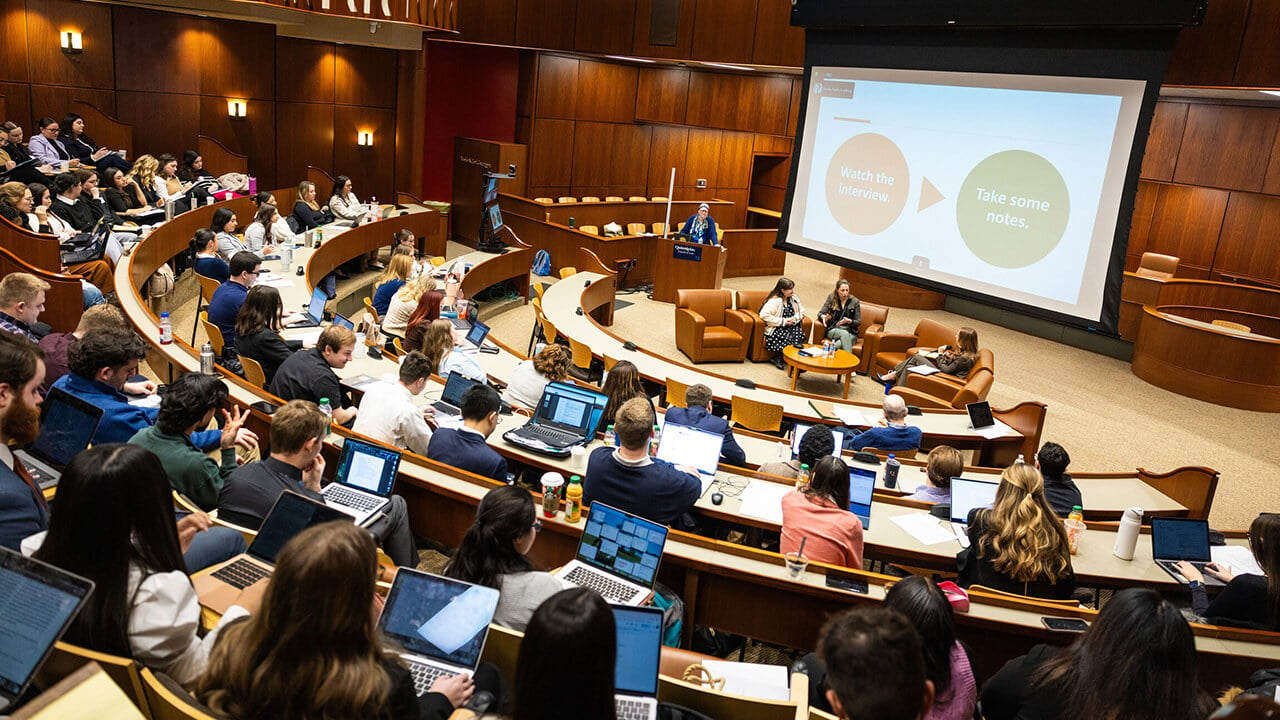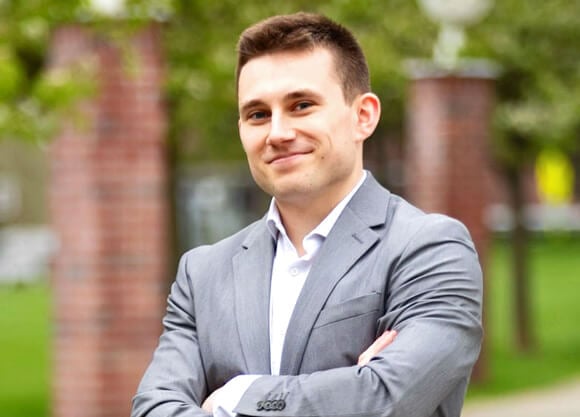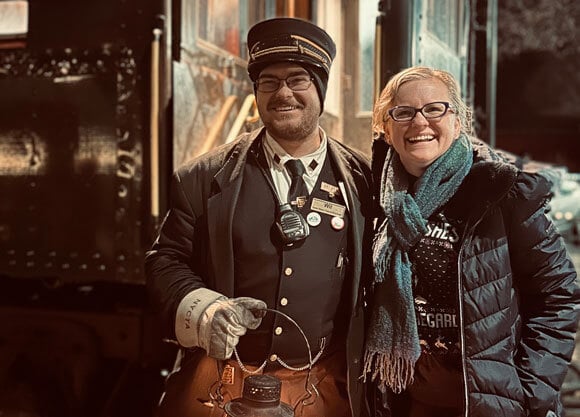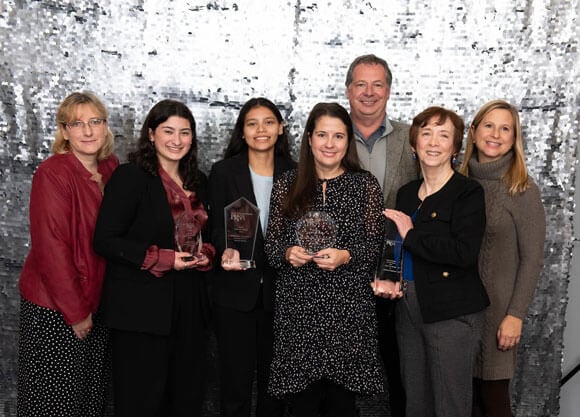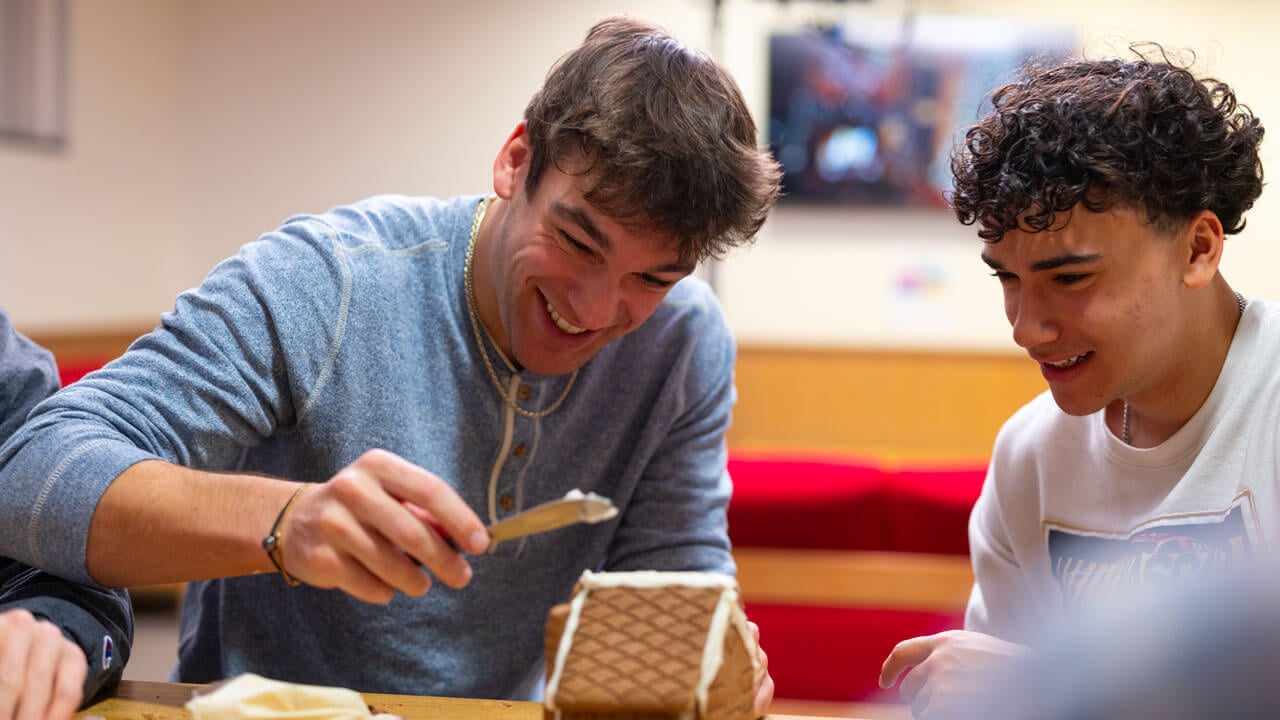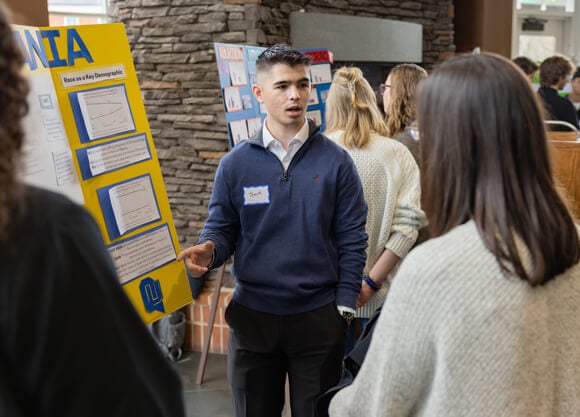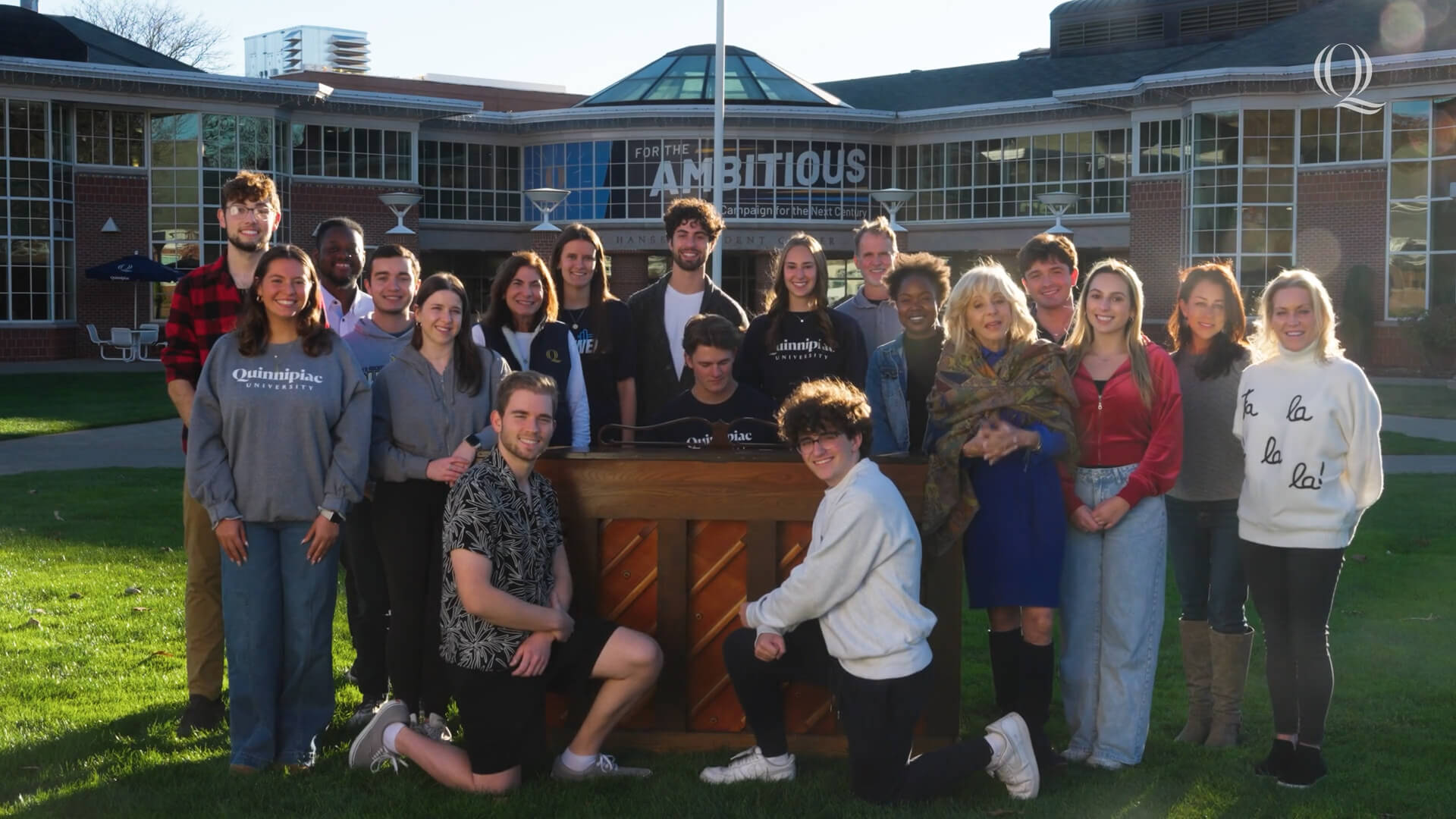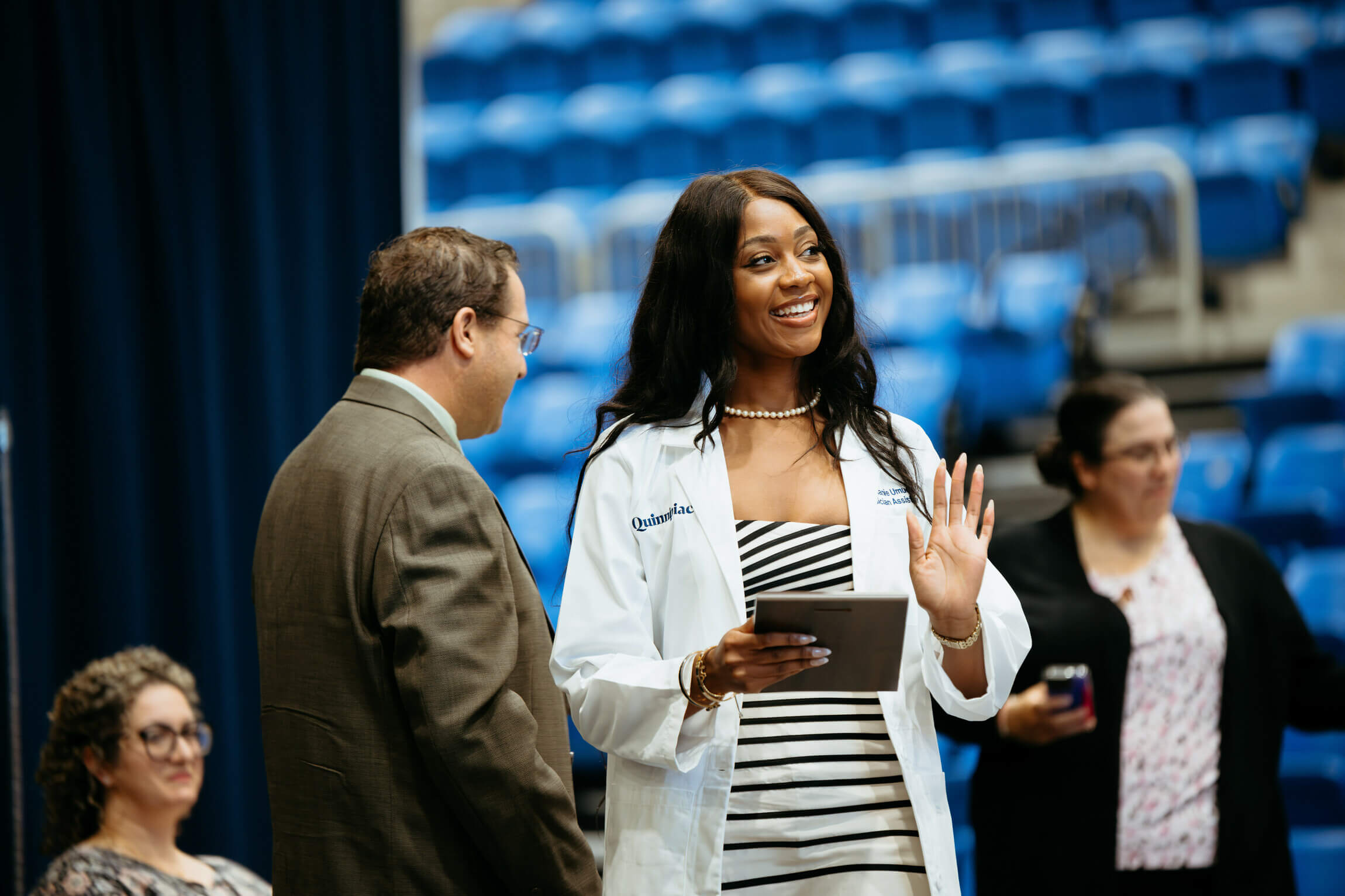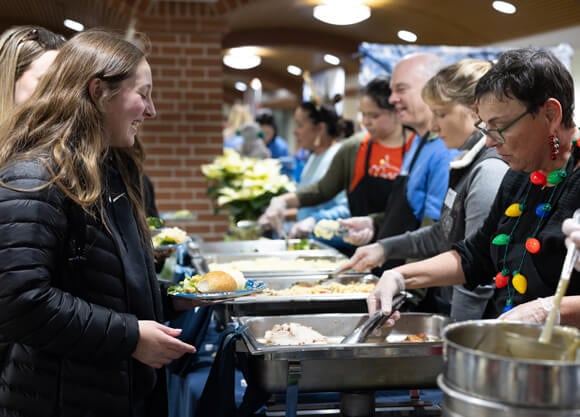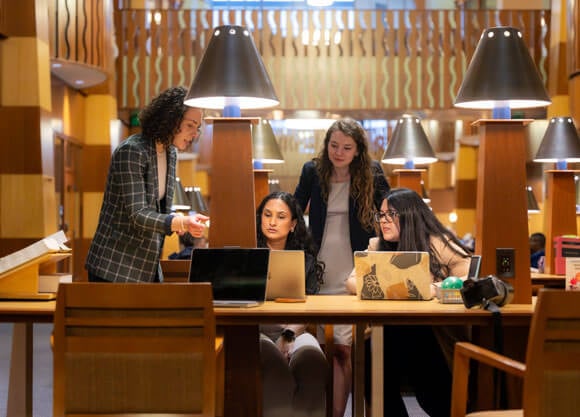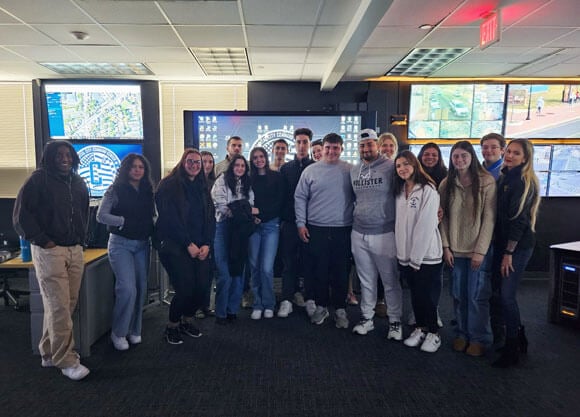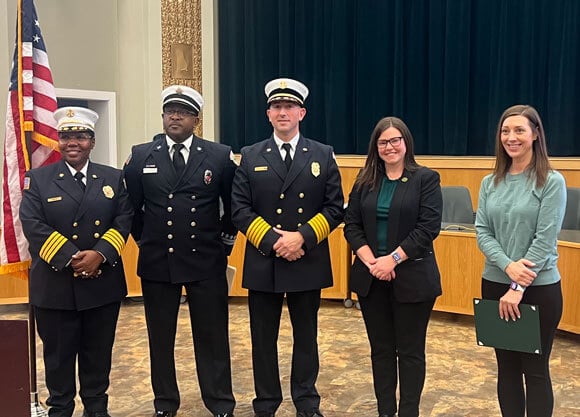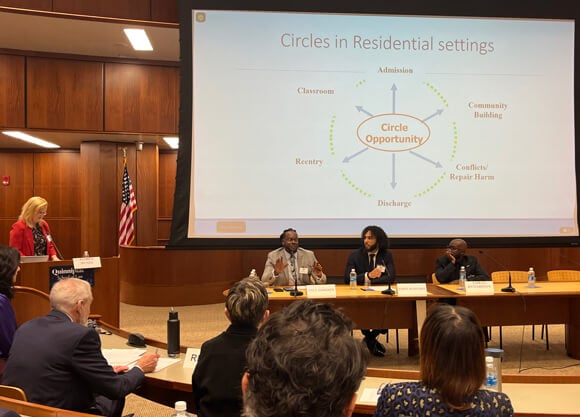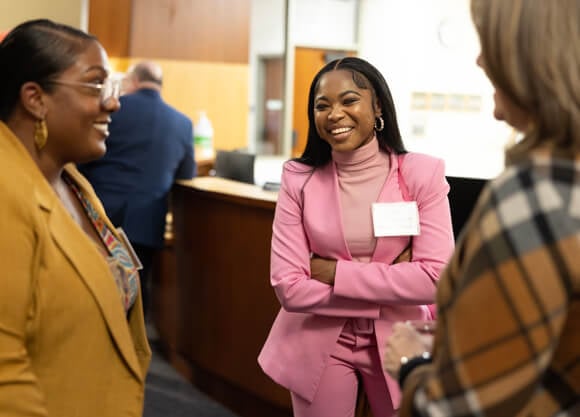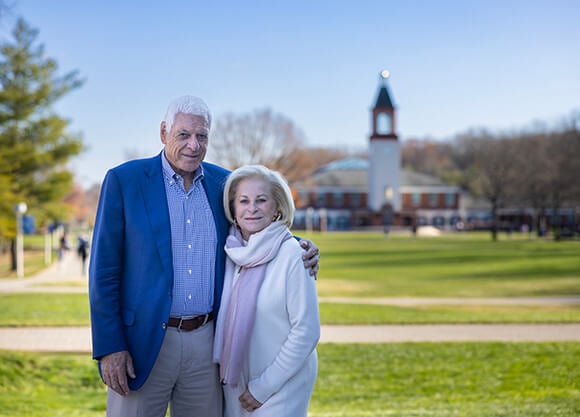
“It is really an important part of our culture that we have direct dialogue with our students, and this is one of those ways in which we can have open dialogue. We really value, appreciate and admire your engagement in the life of this community,” said Olian. “And I appreciate the expressions of you all here. That is exactly what we encourage.”
Hosted annually by the Student Government Association, the 90-minute discussion featured a panel of Quinnipiac senior administrators who answered questions and provided insight into the short-and long-term strategic goals of Quinnipiac. Joining Olian were Debra Liebowitz, provost; Tom Ellett, chief experience officer; David Fryson, interim vice president for inclusive excellence; and Salvatore Filardi, vice president for facilities and capital planning.
Students submitted questions before the event or engaged directly with panelists live during the forum. The discussion was moderated by SGA Vice President Kay Owolabi ’24, who opened the conversation with a question to Olian about the current priorities of Quinnipiac’s Board of Trustees.
“The priorities of our board stem from the fact that our trustees are the guardians of the resources, values and ideals of our university,” said Olian. “I’ve been saying there has never been a better time to be a Bobcat – and it’s true. The momentum and energy found across Bobcat Nation is due, in large part, to our trustees.”
Olian continued by highlighting the opening of the Recreation and Wellness Center and the creation of the new South Quad as examples of the capital plans, infrastructure and capital improvements that continue to be a major priority for the board.
Throughout the conversation, insightful questions underscored the compassion and commitment of Quinnipiac students for each other and their dedication to maintaining an inclusive campus culture, while also advocating for continued leadership in local and global issues. Topics ranged from student input on new campus spaces to resources for underrepresented communities on campus.
In a submitted question, students asked about current plans to balance the number of federal work-study jobs with non-aid work opportunities for students on campus.
Ellett assured students that non-aid positions continue to be a top priority, citing examples where the university has worked to grow student employment opportunities in dining services, the new South Quad and QU’s partnership with Hartford HealthCare. Ellett encouraged interested students to reach out to the Career Services Office for further information on part-time jobs and career shadowing.
One student asked about political activities on campus and planned safety initiatives in response to the 2024 presidential election. In his response, Ellett spoke about the reactivation of the voter education committee and the multiple ways in which the university partners with local authorities to stay ahead of the curve on safety issues.
In addition, Olian noted the importance of modeling tolerance and patience in the face of political discord.
“We need to be a microcosm of civil society. We can govern our own behavior. And we should not just tolerate but embrace differences of opinion. That is our responsibility as a microcosm of civil society,” Olian said.
The panel also answered questions regarding safety and security issues on campus including concerns over the national rise in hate crimes targeting Muslim and Jewish students. Several students stepped forward to speak about a recent QU Chronicle op-ed article on the Israeli-Hamas war. In her response, Olian stressed the importance of informed conversation and encouraged the audience to attend the April 8 Critical Conversation Series Event with speakers Omar Dajani and Mira Sucharov who will debate the genesis and evolution of the Israeli-Palestinian conflict.
Olian went on to express her empathy and understanding for the emotional response the op-ed elicited from readers but noted that it is the university’s policy not to censor its student media. She elaborated on the role of the free press in society and reaffirmed that student journalists are also held responsible for reporting the news in an unbiased and balanced fashion. Olian reminded the audience that all students are held accountable for hate speech violations under the university’s Student Code of Conduct.
Campus construction questions focused on the use of spaces and renovation plans for current academic and residence halls. Filardi highlighted recent updates including the opening of the Rec and Wellness Center, South Quad addition, refurbished athletic facilities, interior roads and the strategic analysis of space needs for current and future programs. Students were assured that their input is being sought to ensure campus spaces meet their needs with Olian adding that constant renovations to existing buildings, including residence halls, have been purposely built into the 10-year plan and are ongoing.
Liebowitz addressed long-term plans for hiring staff to support the expansion of programming, the retention of underrepresented faculty members and the role of the university’s new Title IX coordinator.
Several questions were raised on support services and future plans for the Office of Inclusive Excellence with senior Emily Diaz asking the panel for insight into what the administration is currently doing for underrepresented students both inside and outside of the classroom.
“We believe that over the next couple of months, we will not only rebuild the Office of Inclusive Excellence, but the office will be stronger than it was before,” said Fryson. “We all have work to do and to be quite frank, we need the help of our students. We can’t speak for you. It’s important to be able to hear your voice. We are working very hard and diligently to make sure that those people that we have lost are replaced so that you will feel supported. In the short term, anytime you need me, please come to the office.”
Olian reiterated the university’s commitment to its goals of inclusive excellence. She added that the entire campus community has a responsibility to maintain the culture of inclusivity and must work together to uphold a sense of welcome for a diverse mix of backgrounds, opinions, worldviews and lived experiences, stressing that it is “everyone’s purpose.”
Other topics of conversation focused on support initiatives for first-generation college students, admissions acceptance rates, a request for a women and gender center and clarification of campus parking procedures.
Stay in the Loop
Quinnipiac Today is your source for what's happening throughout #BobcatNation. Sign up for our weekly email newsletter to be among the first to know about news, events and members of our Bobcat family who are making a positive difference in our world.
Sign Up Now